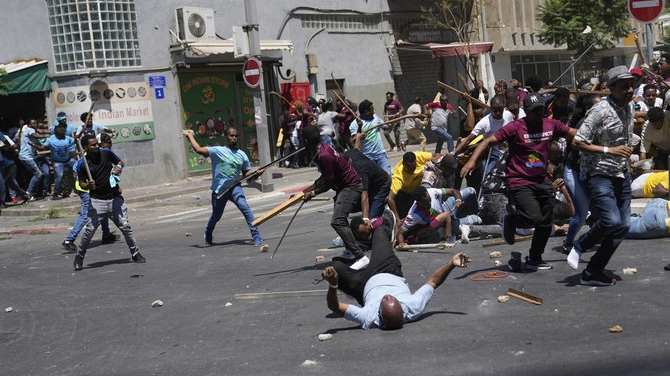
Around 170 individuals sustained injuries during turbulent confrontations with the police and internal skirmishes between factions of both pro and anti-Eritrean government supporters.
Prime Minister Benjamin Netanyahu stated that a “red line” had been breached.
He has also issued directives for the development of a fresh strategy to expel all African migrants, whom he referred to as “illegal infiltrators.”
The extraordinary chaos on Saturday originated when activists opposed to the Eritrean government reported requesting Israeli authorities to cancel an event arranged by the Eritrean embassy in their country.
They managed to breach a police barricade encircling the venue, leading to its subsequent vandalism.
Police donning riot gear deployed tear gas, stun grenades, and live ammunition, while officers mounted on horseback endeavored to disperse the demonstrators.
An inquiry has been initiated to determine whether the utilization of live ammunition was in compliance with the law.
Israeli police, including several dozen who sustained injuries, expressed that they perceived their lives to be in jeopardy.
Dramatic street clashes unfolded involving large gatherings of Eritrean individuals armed with makeshift weapons such as pieces of wood, metal, and rocks. In addition to engaging each other, they also engaged in vandalism, damaging shop windows and vehicles.
The internal divisions concerning the leadership of President Isaias Afwerki in Eritrea have extended into the diaspora, and this recent eruption of violence is the most recent instance in recent weeks.
According to residents, the streets of central Tel Aviv resembled a war zone for several hours, marked by the presence of police helicopters hovering overhead and the incessant blaring of sirens.
Migrants back on the spotlight
The unrest has reintroduced the contentious topic of migrants to the political forefront, occurring concurrently with Israel’s ongoing divisions concerning the highly contentious judicial overhaul plan proposed by the hardline government.
Prime Minister Netanyahu and other members of his cabinet have attributed previous unsuccessful attempts to expel migrants from Israel to the Supreme Court’s obstruction.
“Now there remains a serious problem with the illegal infiltrators in south Tel Aviv and elsewhere,” the prime minister said at Sunday’s special government meeting.
“We want harsh measures against the rioters, including the immediate deportation of those who took part.”
He has requested that the ministers provide him with proposals for the expulsion of all other undocumented infiltrators.
The far-right National Security Minister, Itamar Ben-Gvir, intends to introduce a bill aimed at amending a portion of Israel’s quasi-constitutional basic law regarding human dignity and liberty. This amendment would facilitate the large-scale deportation of migrants who entered the country illegally.
Approximately 18,000 asylum seekers from Eritrea currently reside in Israel, with the majority having arrived illegally several years ago by crossing Egypt’s Sinai Peninsula. They assert that they fled due to imminent danger, persecution, and mandatory military conscription in one of the world’s most oppressive nations.
While Eritreans who support the regime may not seem to require international protection as refugees, Israeli authorities have not previously differentiated between asylum seekers based on their political affiliations.
As Eritrea commemorates its 30th anniversary of independence from Ethiopia, festivals have been organized by the Eritrean diaspora.
Apart from Israel, certain events in Europe and North America have also witnessed incidents of violence. For instance, last month, a three-day Eritrean cultural festival in Toronto, Canada, was canceled due to clashes between supporters and opponents of Eritrea’s regime.
